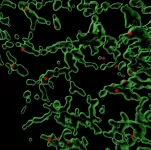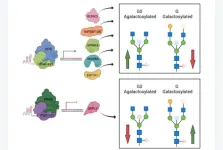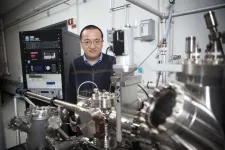(Press-News.org) Weill Cornell Medicine researchers received a $2.4 million grant from the U.S. Department of Defense Breast Cancer Research Program to validate a new blood test for the early detection of breast cancer.
Researchers are evaluating Syantra DX Breast Cancer (Syantra Inc.), an experimental diagnostic test that detects specific biomarkers in blood associated with breast cancer. The test uses an artificial intelligence algorithm to determine whether a patient is positive for cancer as soon as detectable by mammogram or possibly earlier, and before symptoms arise.
“This new liquid biopsy, or blood test, has the potential to detect breast cancer at a very early stage. Early diagnosis means treatment can start sooner when it is most effective, saving lives,” said the study’s principal investigator Dr. Massimo Cristofanilli, professor of medicine and director of breast medical oncology in the division of hematology and medical oncology at Weill Cornell Medicine.
Each year, about 240,000 women are diagnosed with breast cancer and nearly 42,000 die from the disease, according to the Centers for Disease Control and Prevention. “Because of modern treatment methods, 86 percent of women diagnosed with stage 3 breast cancer survive past five years. However, this number drops to just 28 percent in women diagnosed at stage 4,” said Dr. Cristofanilli, who is also a medical oncologist at NewYork-Presbyterian/Weill Cornell Medical Center.
Finding cancer early can also reduce the need for invasive treatments like double mastectomy and chemotherapy, which can cause nausea, vomiting, hair loss and other difficult side effects.
Diagnosing Women with Elevated Breast Cancer Risk
Previous smaller studies showed promise in women who were at a lower risk of breast cancer. With this grant, Dr. Cristofanilli will evaluate the performance of the Syantra DX Breast Cancer test in women ages 30 to 75 who have an elevated risk of developing breast cancer, including those with dense breast tissue, abnormal mammograms, genetic predisposition, or suspicious breast symptoms.
While mammography is the gold standard for breast cancer screening, it is not as effective in women with dense breast tissue, which affects almost half of all women and younger women disproportionately. Inherited genetics, family history, and older age also increase risk of breast cancer.
Participants will be recruited at NewYork-Presbyterian/Weill Cornell Medical Center, NewYork-Presbyterian/Columbia University Irving Medical Center and the University of Calgary. They will have their blood drawn for the liquid biopsy and also complete standard-of-care screening with mammography or any other physician recommended procedures such as MRI or ultrasound, which can help screen dense breast tissue.
The primary objective is to measure the Syantra DX Breast Cancer test’s specificity, meaning the ability to correctly identify women who do not have a have breast cancer, and sensitivity, the ability to identify those who do have breast cancer. A positive test result, indicating that early cancer is present, will always require follow-up assessment with a pathologist who will use biopsy tissue to confirm a diagnosis, said Dr. Cristofanilli, associate director of precision medicine at the Sandra and Edward Meyer Cancer Center and scientific director at the Englander Institute of Precision Medicine, both at Weill Cornell Medicine.
Increasing Access and Convenience for All
“We want to make it easier for women to be screened for breast cancer,” Dr. Cristofanilli said. While mammograms are important for early detection, it is not necessarily the best test for women with dense breasts and younger women with genetic predisposition.
In addition, the researchers hope the test can be used worldwide in underserved populations or where access to standard imaging equipment isn’t readily available. A simple blood test used in a local doctor’s office that does not require travel to an imaging center could also help to improve regular screening.
“This new area of technology for detecting cancer in the blood is very important,” Dr. Cristofanilli said. “This is clearly an example of Weill Cornell Medicine researchers striving to be innovative and offering the best possible technologies to advance and improve the outcomes for the women that we serve.”
Many Weill Cornell Medicine physicians and scientists maintain relationships and collaborate with external organizations to foster scientific innovation and provide expert guidance. The institution makes these disclosures public to ensure transparency. For this information, see the profile of Dr. Massimo Cristofanilli.
END
Weill Cornell Medicine receives grant for blood test to diagnose breast cancer
2024-01-03
ELSE PRESS RELEASES FROM THIS DATE:
Using the body’s own cells to treat traumatic brain injury
2024-01-03
Scientists have created a new treatment for traumatic brain injury (TBI) that shrank brain lesions by 56% and significantly reduced local inflammation levels in pigs. The new approach leverages macrophages, a type of white blood cell that can dial inflammation up or down in the body in response to infection and injury. The team created disc-shaped microparticles called “backpacks” containing anti-inflammatory molecules, then attached them directly to the macrophages. These molecules kept the cells in an anti-inflammatory state ...
UW–Madison scientists reveal the inner workings of an essential protein trafficking complex
2024-01-03
MADISON – Like mail carriers who manage to deliver their parcels through snow, rain, heat and gloom, a critical group of mammalian proteins helps cells function properly even under less-than-ideal conditions.
Using state-of-the-art cell imaging and genome editing technology, University of Wisconsin–Madison scientists have begun to unravel how this collection of proteins performs its essential service. The discovery could eventually help researchers better understand and develop new treatments for diseases like cancer, diabetes and those that cause immune dysfunction.
Led by Anjon Audhya, a professor in the Department of Biomolecular Chemistry, the research team sought ...
Mapping of the gene network that regulates glycan clock of ageing
2024-01-03
“[...] we were able to confirm the functional role of three genes (MANBA, TNFRSF13B and EEF1A1) in the IgG galactosylation pathway [...]”
BUFFALO, NY- January 3, 2024 – A new research paper was published in Aging (listed by MEDLINE/PubMed as "Aging (Albany NY)" and "Aging-US" by Web of Science) Volume 15, Issue 24, entitled, “Mapping of the gene network that regulates glycan clock of ageing.”
Glycans are an essential structural component of immunoglobulin G (IgG) that modulate its structure and function. However, regulatory mechanisms behind this complex posttranslational ...
Computational method discovers hundreds of new ceramics for extreme environments
2024-01-03
DURHAM, N.C. – If you have a deep-seated, nagging worry over dropping your phone in molten lava, you’re in luck.
A research team led by materials scientists at Duke University has developed a method for rapidly discovering a new class of materials with heat and electronic tolerances so rugged that they that could enable devices to function at lava-like temperatures above several thousands of degrees Fahrenheit.
Harder than steel and stable in chemically corrosive environments, these materials ...
Community cancer care linked with poorer outcomes for patients with a common head and neck cancer
2024-01-03
FOR IMMEDIATE RELEASE
Care for patients with human papillomavirus (HPV)-related squamous cell cancers of the oropharynx (an area in back of the throat) is shifting toward community cancer centers, but patients treated in this setting may be less likely to survive, according to new research by investigators from the Johns Hopkins Kimmel Cancer Center and its Head and Neck Cancer Center.
The study, published Jan. 3 in the Journal of the National Cancer Institute, raises concerns about the quality of care that patients with this type of head and neck cancer receive outside of academic medical centers. Patients treated ...
Beta blocker used to treat heart problems and other medical concerns could be new treatment for sickle cell cardiomyopathy
2024-01-03
INDIANAPOLIS—A beta blocker typically used to treat heart problems, hemangioma, migraines and anxiety could be a new therapeutic for patients with sickle cell disease. Researchers led by Ankit A. Desai, MD, associate professor of medicine at the Krannert Cardiovascular Research Center (KCVRC) at Indiana University School of Medicine, have been awarded a $3 million grant by the U.S. Department of Defense to evaluate the efficacy of this drug.
Patients with sickle cell disease, a red blood ...
Cleveland Clinic and University of Western Ontario awarded $4.9 million from the Helmsley Charitable Trust to build Crohn’s disease and ileostomy research consortium
2024-01-03
Cleveland Clinic and the University of Western Ontario have been awarded a $4.9 million grant from Helmsley Charitable Trust to build a consortium to develop clinical trial outcome tools for patients with Crohn's disease and permanent ileostomy.
A permanent ileostomy is a surgical procedure to divert stool from the intestine after removing part of or the whole colon. The new Endpoint Development for Ostomy Clinical Trial (EndO-trial) Consortium seeks to develop more effective drugs for patients with Crohn's disease who have undergone ...
Researchers improve seed nitrogen content by reducing plant chlorophyll levels
2024-01-03
Chlorophyll plays a pivotal role in photosynthesis, which is why plants have evolved to have high chlorophyll levels in their leaves. However, making this pigment is expensive because plants invest a significant portion of the available nitrogen in both chlorophyll and the special proteins that bind it. As a result, nitrogen is unavailable for other processes. In a new study, researchers reduced the chlorophyll levels in leaves to see if the plant would invest the nitrogen saved into other process that might improve nutritional quality.
Over the past few decades, researchers ...
How does corrosion happen? New research examines process on atomic level
2024-01-03
BINGHAMTON, N.Y. -- When water vapor meets metal, the resulting corrosion can lead to mechanical problems that harm a machine’s performance. Through a process called passivation, it also can form a thin inert layer that acts as a barrier against further deterioration.
Either way, the exact chemical reaction is not well understood on an atomic level, but that is changing thanks to a technique called environmental transmission electron microscopy (TEM), which allows researchers to directly view molecules interacting ...
Survival of the fittest: Words like 'Sex' and 'fight' are most likely to stand the test of time
2024-01-03
New research from the University of Warwick reveals that words like 'sex' endure in our language in a ‘survival of the fittest’ way, similar to natural selection.
Whilst the recent announcement of Word of the Year explores new words, like ‘rizz’ or ‘situationship’, Professor Thomas Hills’ research delves into why some words survive in our modern linguistic landscape, while others don’t.
The study concludes that words with the strongest lasting power are:
Words acquired earlier in life
Words associated with things people can see ...




